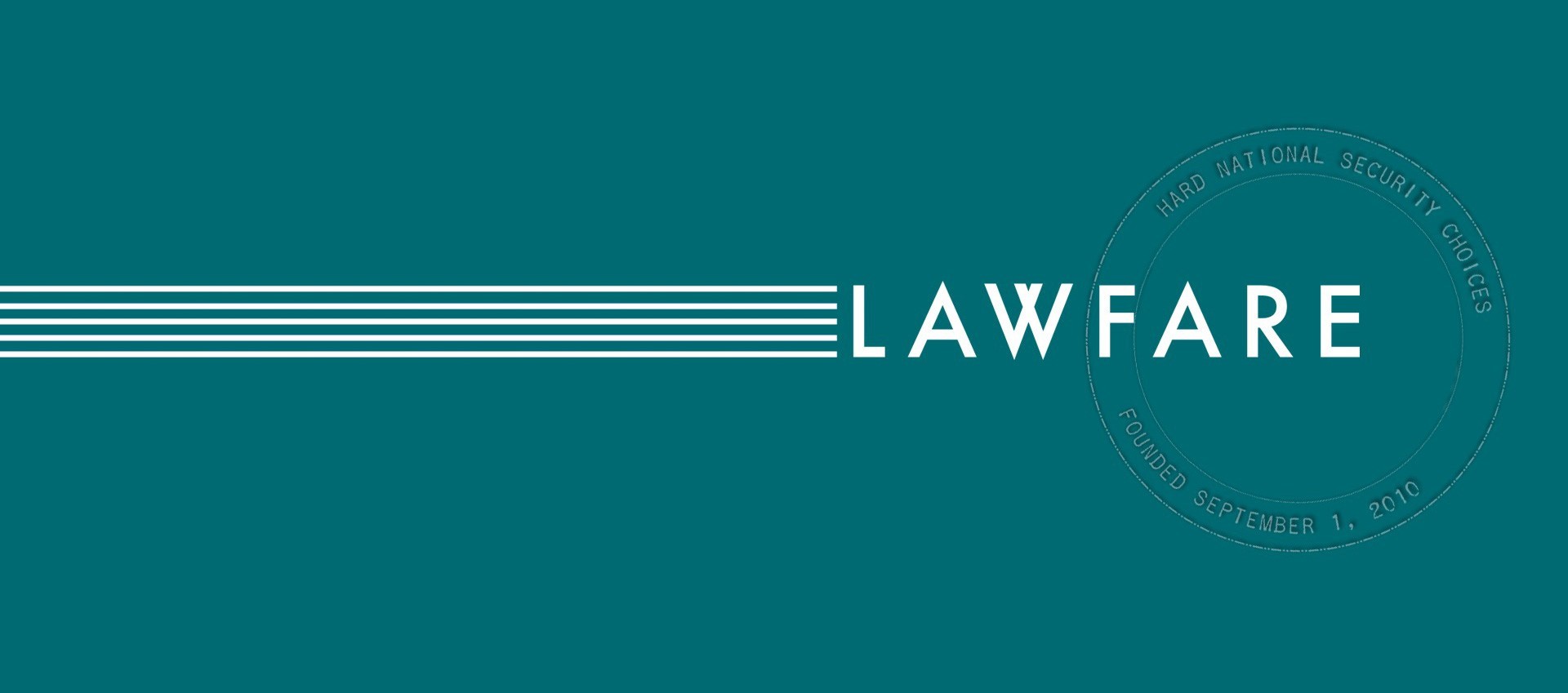The Week That Was: All of Lawfare in One Post
On Thursday, the Senate passed the bill reauthorizing the FISA Section 702 surveillance program for another six years. Emma Kohse summarized the bill. Susan Hennessey and Jack Goldsmith argued that even those wary of President Trump’s loose commitment to the rule of law should support the reauthorization.
Published by The Lawfare Institute
in Cooperation With

On Thursday, the Senate passed the bill reauthorizing the FISA Section 702 surveillance program for another six years. Emma Kohse summarized the bill. Susan Hennessey and Jack Goldsmith argued that even those wary of President Trump’s loose commitment to the rule of law should support the reauthorization.
Giving a view on surveillance from across the pond, Vanessa Sauter posted the Lawfare Podcast, featuring a conversation with David Anderson on the U.K.'s intelligence policies:
Robert Litt argued that Trump is wrong to accuse Peter Strzok of treason.
Shane Reeves and Robert Lawless analyzed whether there is an international legal basis for a "bloody nose" strike on North Korea.
Benjamin Wittes posted a special edition of the Lawfare Podcast, featuring an interview with Anthony Cormier on his reporting about the investigation into suspicious payments from the Russian embassy during the 2016 election:
Sarah Grant and Jack Goldsmith analyzed where the United States is fighting terrorists around the world and how the armed conflict has changed since the Obama administration.
Evelyn Douek responded to Sen. Ben Cardin’s staff report about Russian interference in democracies, arguing that its recommendations do not adequately address the role of social media influence operations.
Ed Stein listed key upcoming Russia sanctions deadlines for the president.
Wittes shared this week’s Rational Security, featuring a discussion of L’Affaire Russe and the Hawaii ballistic missile alert:
Vanessa Sauter posted the transcript from the interview of Glenn Simpson, Fusion GPS CEO, before the House intelligence committee in November.
Josh Blackman analyzed Attorney General Jeff Sessions’s letter to the Department of Homeland Security about DACA.
Sauter posted the livestream of Homeland Security Secretary Kirstjen Nielsen’s testimony before the Senate Judiciary Committee.
On Tuesday, the Supreme Court heard arguments in Dalmazzi v. U.S. Harry Graver summarized the briefs and oral arguments.
On the National Security Law Podcast, Robert Chesney debriefed Dalmazzi with Steve Vladeck, who argued the case before the Court:
Chesney discussed the merits of a new habeas petition for 11 Guantanamo Bay detainees claiming the government’s authority to detain them under the 2001 AUMF has expired.
Sarah Grant summarized last week's pretrial proceedings in the 9/11 case at the military commissions.
On Thursday, Judge Tanya Chutkan ordered the government not to transfer the unnamed U.S. citizen being held as an enemy combatant pending a ruling on the habeas petition in Doe v. Mattis. Matthew Kahn posted the order.
Chesney analyzed Chutkan’s decision to bar the detainee’s transfer.
Herb Lin and Paul Rosensweig responded to Suan Landau’s call for a new definition of cybersecurity that includes information warfare, agreeing that protecting U.S. election requires attention to both information warfare and cybersecurity concerns.
Klon Kitchen argued that the U.S. needs to convene a new Solarium project to address the national security dimensions of cybersecurity.
Lin analyzed whether the newly released Nuclear Posture Review implies that the U.S. would respond to a devastating cyber attack with nuclear force.
Stewart Baker posted this week’s Cyberlaw Podcast, featuring an interview with Shane Harris and discussion of the 702 reauthorization effort:
Matthew Kahn shared the arrest affidavit of Jerry Chun Shing Lee, the former CIA agent suspected of providing classified information to the Chinese government.
In this week’s Middle East Ticker, Dana Stuster discussed the Iran sanctions waiver, Turkey’s plan to attack U.S.-backed forces in Syria, and the U.N.’s claim that Iran is providing missile to Yemeni rebels.
Yishai Schwartz reviewed Nitsana Darshan-Leitner and Samuel Katz's book, “Harpoon: Inside the Covert War Against Terrorism’s Money Masters.”
Alex Thurston discussed five myths that some experts believe about Boko Haram.
Laurie Blank addressed whether using shovels as weapons in war is lawful.
Ashley Deeks warned that the United States needs to start thinking about how to address pervasive domestic surveillance in other states, including China.
And that was the week that was.





